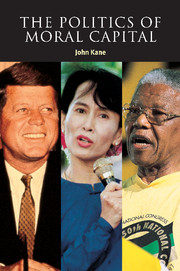Book contents
- Frontmatter
- Contents
- Acknowledgments
- Introduction
- Part I Moral capital
- Part II Moral capital in times of crisis
- Part III Moral capital and dissident politics
- 5 Nelson Mandela: the moral phenomenon
- 6 Aung San Suu Kyi: her father's daughter
- Part IV Moral capital and the American presidency
- Epilogue
- Bibliography
- Index
6 - Aung San Suu Kyi: her father's daughter
Published online by Cambridge University Press: 22 September 2009
- Frontmatter
- Contents
- Acknowledgments
- Introduction
- Part I Moral capital
- Part II Moral capital in times of crisis
- Part III Moral capital and dissident politics
- 5 Nelson Mandela: the moral phenomenon
- 6 Aung San Suu Kyi: her father's daughter
- Part IV Moral capital and the American presidency
- Epilogue
- Bibliography
- Index
Summary
If they ever assassinate me, make sure you really make capital out of it.
Aung San Suu Kyi to party colleaguesThough the story of Aung San Suu Kyi (pronounced Awng Sahn Su Chee) is interwoven deeply with that of modern Burma, it was chance or perhaps destiny that found her present at the most critical hour of its recent history. Normally resident in the UK with her English husband and two sons, she had returned to the country of her birth to care for her terminally ailing mother, Khin Kyi, and was therefore on hand when the country erupted into full-scale revolt in August 1988.
Trouble had begun the year before when an unpopular decision by President Ne Win had provoked strong student protest. It was a spark that, in the combustible conditions of Burmese society, produced an eventual conflagration. After a quarter-century of authoritarian misrule by Ne Win and his Burma Socialist Programme Party (BSPP), it had become abundantly clear that the “Burmese road to socialism” down which the ageing dictator had been taking the country since 1962, and for the sake of which he had effectively isolated the country from the international community, led nowhere but to economic ruin. In 1987, Burma had been forced to apply for the status of Least Developed Country to gain relief from its burden of foreign debt. For a potentially rich nation that had once been Asia's leading rice exporter, this was a cause of deep shame and frustration.
- Type
- Chapter
- Information
- The Politics of Moral Capital , pp. 147 - 172Publisher: Cambridge University PressPrint publication year: 2001

